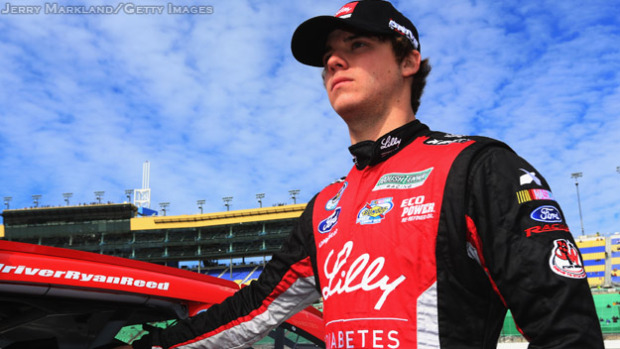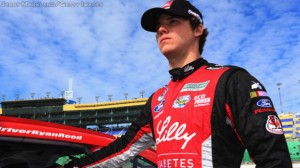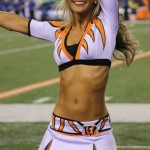Ryan Reed’s Drive to Stop Diabetes
To meet an athlete with purpose outside of their sport is rare. Trust me, I’ve interviewed hundreds of athletes young and old, talented and barely so, good and bad.
NASCAR driver Ryan Reed (driving the #16 Ford Mustang for Drive To Stop Diabetes) knows more about driving than just what has to do with fast cars – he knows how to turn his passion and what some would consider misfortune into a desire to advocate for others. To make a statement at high speeds. “It’s great to work with a company like Lilly Diabetes because they too encourage people with diabetes, no matter the type they have, to live life without limits,” Reed says.
Which is exactly what he’s doing–living (and racing) life without limits.
The barely 21-year-old says, “A good driver must always keep his head clear and his focus straight ahead.” No matter what obstacles come his or her way – like being diagnosed with Type I Diabetes three years ago.
The diagnosis was sudden, which is just one of the reasons Reed pushes awareness to others. “I had a lot of symptoms–I was really thirsty all the time, weight loss, very typical symptoms which I didn’t know then. I went to the doctor, and after seven or eight weeks they diagnosed me on the spot with Type I Diabetes. That was a tough diagnosis for sure,” he recalls.
“They said I’d never race again–I think the main reason [for telling him he’d never race again] is how are you going to monitor your blood sugar first of all? It’s not like you can pull your glove off in the middle of the race and prick your finger to check your blood sugar. What happens if you have high or low blood sugar –those are the biggest things/dangers in racing,” he says.
As for telling Reed, someone who has been racing since the wee age of four that he had to give up his dream – no way. “I didn’t want to listen to someone tell me I couldn’t – I don’t know if that is stubbornness or what. My family is behind me no matter what. If I wanted to go back to school or continue to pursue racing – obviously I wanted to continue racing. I just put my head down and tried to understand it [the disease] more. There are a lot of athletes competing with diabetes. That’s how I kind of stumbled upon my doctor, and inspired me to continue to pursue racing even after the diagnosis,” he says.
“I was really fortunate to find this amazing doctor who is very active with a lot of athletes with Type I Diabetes. She was very influential in getting me back on the track,” Reed says. “She” is Anne Peters, M.D., Director of the USC Westside Center for Diabetes, and Director of the Comprehensive Diabetes Center at Roybal Community Medical Center. He notes their constant communication through pretty much anything. “She’s definitely all hands on deck,” he says recalling multiple times she’s walked him through an illness on the road.
“If my blood sugar is too high then there’s a guy to come over in the pit stop to give me an insulin injection – those are things I had adjust to, but I find it pretty cool that my doctor was so willing to help me out,” Reed says. Not to mention how willing his crew was to learn more and help along the way.
“They [his crew] didn’t have to but they all took a genuine interest and wanted to know more – whether it’s my friends or my crew or anyone around me, they want to understand the symptoms and the illness. When I’m on the track they have to understand how it works, we have to practice it,” he says.
“Managing my diabetes can be challenging at times, and it’s something I have to work at every day. I’m working closely with my doctor and actively managing my disease to hopefully avoid complications,” he says.
Diabetes or not, Reed has been an inspiration all around NASCAR and beyond. “If you continue doing what you love–that’s something I like to get across to fans – whether it’s basketball, football, whatever it is – you can continue to chase your dreams. I obviously tell them about my diagnosis and how I was able to overcome that. If they look up to me – that’s an amazing thing,” he says modestly.
Reed isn’t the only athlete who has battled diabetes in the public eye – guys like Olympic skier Kris Freeman, swimmer Jay Hall, IndyCar driver Charlie Kimball, and quarterback Jay Cutler understand firsthand what Reed has overcome and what must continue to push through.
But don’t think for a minute Ryan Reed is all NASCAR and diabetes talk. After all, he is just 21 and takes as many chances to live life and just have fun like the rest of us. When it comes to pranks, he just laughs. “I have two roommates, both NASCAR drivers, and I don’t think the pranks ever stop. There are so many I don’t think I even know any off the top of my head – you can walk out of your room and get bombarded by silly string or see stickers all over your car,” he says.
He’s also got plenty of time for football. “I am a pretty big Cowboys fan,” he says. “My dad was a Cowboys fan so I was kind of born into it, good or bad, it is what it is. Everyone asks me, ‘You’re from California – how are you a Cowboys fan?” And I live in N.C. now. My dad was a Cowboys fan, I guess I wanted to be like dad.”
Reed knows from fandom; he sees a passionate breed of NASCAR fan every single week. “They get so passionate. If you’re not their driver or you wreck their driver, or if their driver doesn’t like you, they get so passionate and so involved. They are just so loyal – I remember watching the Daytona 500 and it rained all day. The race was postponed for like six or seven hours and about an hour into the race the stands were full again. I don’t know where they went and hung out all day and came right back, but I think that dedication and loyalty to the sport is amazing and definitely inspires me and makes me appreciate what I do for a living,” Reed says.
As for the love-hate relationship you see and hear between fellow drivers, Reed calls it an “interesting dynamic.”
“I think any driver will tell you we’re not out here to make friends on the track, but at the same time it’s such a tight knit community, we’re all in the same place at the same time–sometimes same hotel–we have a lot of respect for each other because we know what each other is going through. If they needed help, I’d be there to help them out, no matter what. My best friends are race car drivers; I’ve raced them many times. I think we have a family bond, not just the drivers, but the crew guys and everyone in the sport – we’re around each other so much we’ve developed a lot of respect for each other. I think it’s pretty cool how everyone gets along. We’ll hug each other during the week and then wreck each other on the weekends,” he says with a laugh.
If you’ve ever watched NASCAR and seen how close the racing community is during a tough time (take the recent Tony Stewart and Kevin Ward Jr. tragedy for instance), you know the truth behind Reed’s sentiment.
No different than any athlete I’ve ended an interview with, Reed sums up our chat by mentioning how much he wants to win and that’s his ultimate goal – like a good driver – always looking ahead.
We drive to get somewhere. Reed drives to stop diabetes. Among other things of course, like top finishes and prize money.
This article originally ran in the sport’s section of CBS Man Cave Daily, click here for the original one with more NASCAR photos.










Leave a Reply
Want to join the discussion?Feel free to contribute!